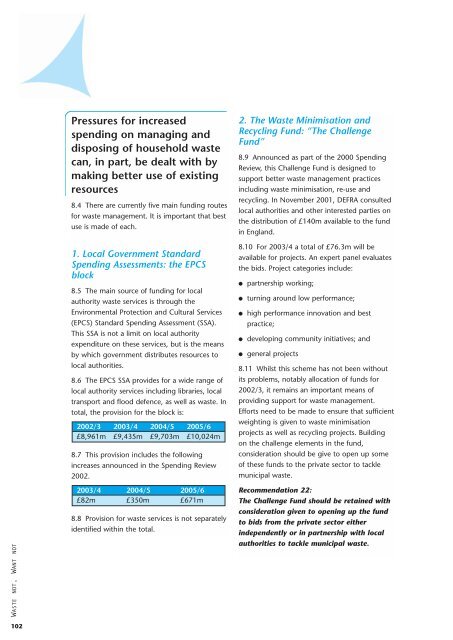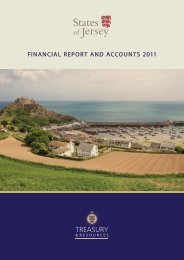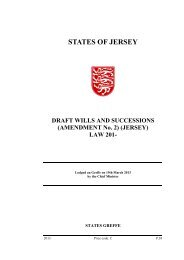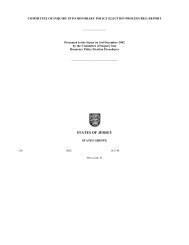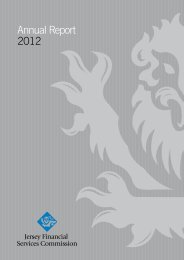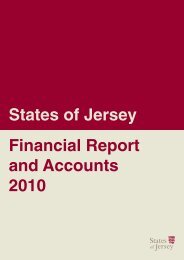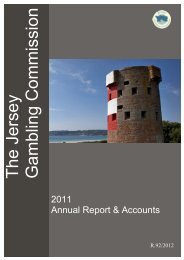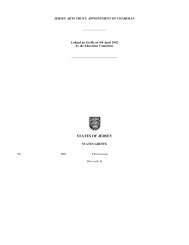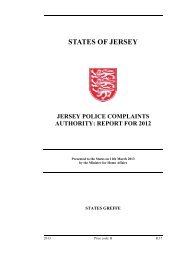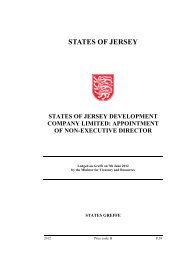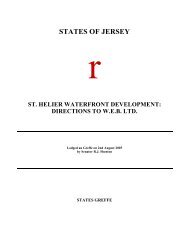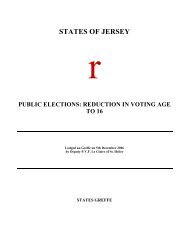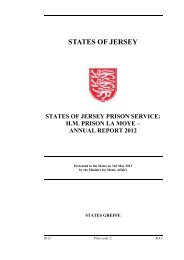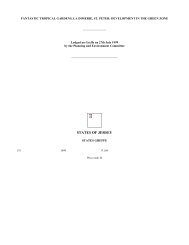Waste not want not - States Assembly
Waste not want not - States Assembly
Waste not want not - States Assembly
You also want an ePaper? Increase the reach of your titles
YUMPU automatically turns print PDFs into web optimized ePapers that Google loves.
WASTE NOT, WANT NOT<br />
102<br />
Pressures for increased<br />
spending on managing and<br />
disposing of household waste<br />
can, in part, be dealt with by<br />
making better use of existing<br />
resources<br />
8.4 There are currently five main funding routes<br />
for waste management. It is important that best<br />
use is made of each.<br />
1. Local Government Standard<br />
Spending Assessments: the EPCS<br />
block<br />
8.5 The main source of funding for local<br />
authority waste services is through the<br />
Environmental Protection and Cultural Services<br />
(EPCS) Standard Spending Assessment (SSA).<br />
This SSA is <strong>not</strong> a limit on local authority<br />
expenditure on these services, but is the means<br />
by which government distributes resources to<br />
local authorities.<br />
8.6 The EPCS SSA provides for a wide range of<br />
local authority services including libraries, local<br />
transport and flood defence, as well as waste. In<br />
total, the provision for the block is:<br />
2002/3 2003/4 2004/5 2005/6<br />
£8,961m £9,435m £9,703m £10,024m<br />
8.7 This provision includes the following<br />
increases announced in the Spending Review<br />
2002.<br />
2003/4 2004/5 2005/6<br />
£82m £350m £671m<br />
8.8 Provision for waste services is <strong>not</strong> separately<br />
identified within the total.<br />
2. The <strong>Waste</strong> Minimisation and<br />
Recycling Fund: “The Challenge<br />
Fund”<br />
8.9 Announced as part of the 2000 Spending<br />
Review, this Challenge Fund is designed to<br />
support better waste management practices<br />
including waste minimisation, re-use and<br />
recycling. In November 2001, DEFRA consulted<br />
local authorities and other interested parties on<br />
the distribution of £140m available to the fund<br />
in England.<br />
8.10 For 2003/4 a total of £76.3m will be<br />
available for projects. An expert panel evaluates<br />
the bids. Project categories include:<br />
●<br />
●<br />
●<br />
●<br />
●<br />
partnership working;<br />
turning around low performance;<br />
high performance innovation and best<br />
practice;<br />
developing community initiatives; and<br />
general projects<br />
8.11 Whilst this scheme has <strong>not</strong> been without<br />
its problems, <strong>not</strong>ably allocation of funds for<br />
2002/3, it remains an important means of<br />
providing support for waste management.<br />
Efforts need to be made to ensure that sufficient<br />
weighting is given to waste minimisation<br />
projects as well as recycling projects. Building<br />
on the challenge elements in the fund,<br />
consideration should be give to open up some<br />
of these funds to the private sector to tackle<br />
municipal waste.<br />
Recommendation 22:<br />
The Challenge Fund should be retained with<br />
consideration given to opening up the fund<br />
to bids from the private sector either<br />
independently or in partnership with local<br />
authorities to tackle municipal waste.


